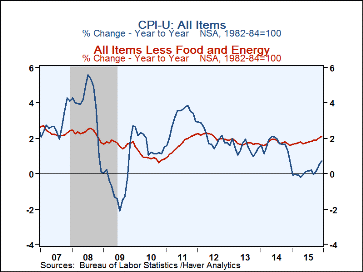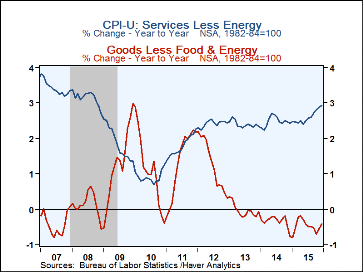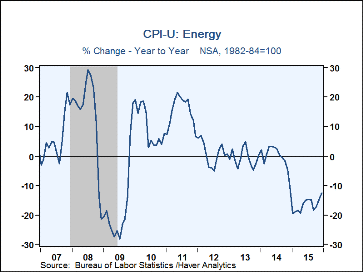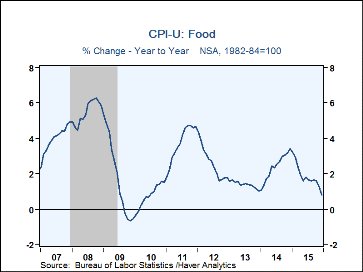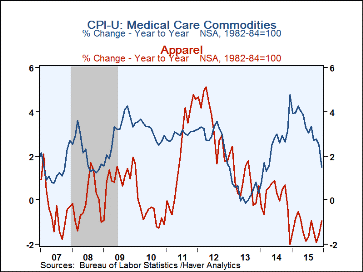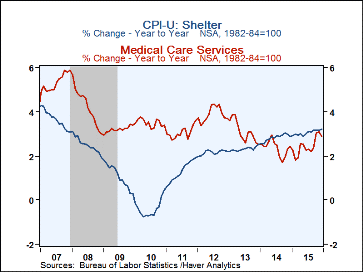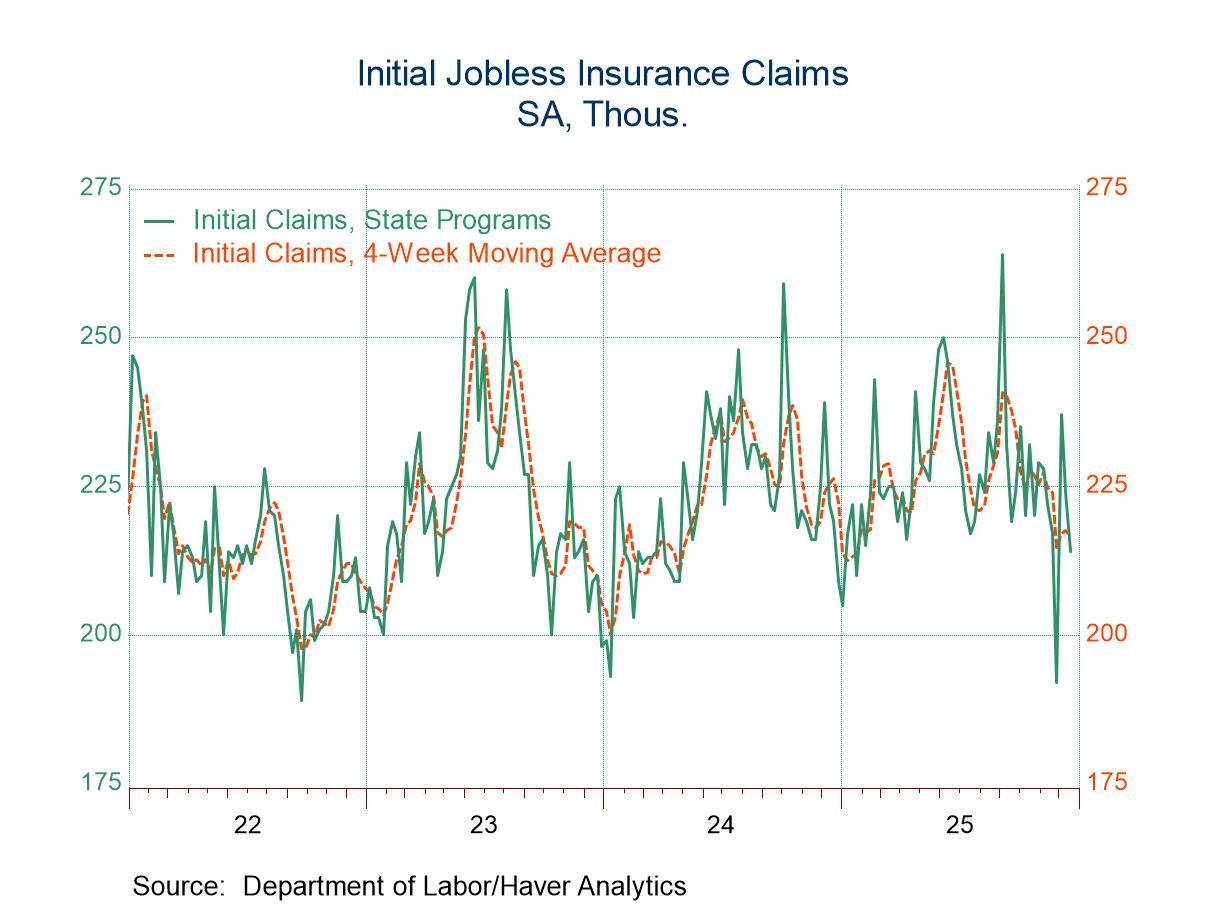 Global| Jan 20 2016
Global| Jan 20 2016U.S. CPI Remains Low as Energy Prices Decline; Core Prices Accelerate
by:Tom Moeller
|in:Economy in Brief
Summary
The Consumer Price Index eased 0.1% during December following no change in November. The 0.7% twelve-month increase compared to 0.8% during 2014 as inflation during both years was held in check by lower energy costs. Prices excluding [...]
The Consumer Price Index eased 0.1% during December following no change in November. The 0.7% twelve-month increase compared to 0.8% during 2014 as inflation during both years was held in check by lower energy costs. Prices excluding food & energy improved 0.1%, following three months of 0.2% gain. The 2.1% rise versus last December was, however, the quickest increase since 2011. No change in the total CPI and a 0.2% rise in core prices were expected in the Action Economics Forecast Survey.
Lower energy prices provided the downward pressure on prices during the year with a 2.4% monthly decline (-12 .6% y/y) in December alone. It was powered by a 19.7% y/y drop in gasoline prices to the lowest level since April 2009. Lower fuel oil prices added to the decline with a 31.4% drop over the course of the year. Natural gas prices followed with a 14.9% y/y fall and electricity prices were off 1.2% y/y.
A 0.2% increase (2.9% y/y) in core services prices followed three consecutive months of 0.3% rise. The firm gains lifted the twelve month gain to 2.9% which was the strongest since 2007. Shelter prices rose 3.2% y/y after a 2.9% increase in 2014. This was the quickest rise since 2007. It was paced by an accelerated 3.7% gain in rents of primary residences and a 3.1% rise in owners equivalent rent of primary residence. Medical care services prices rose 2.9% y/y, up from 2.4% in 2014. Recreation services cost increases accelerated to 2.5% y/y versus 1.5% a year earlier. Public transportation prices fell 1.0% y/y after a 2.9% decline in 2014.
Core goods prices eased 0.1%, the eighth monthly decline of the year. A second straight 0.6% decline (-2.9% y/y) in recreation goods prices paced last month's weakness. Prices for video & audio products fell 7.3% y/y. That was followed by a 0.2% fall (-0.9% y/y in apparel prices, led by a steady 0.6% drop (-2.2% y/y) in women's clothing prices. New vehicle prices edged 0.1% lower (+0.2% y/y), but they rose a quicker 0.6% during the whole year. Medical care goods prices eased 0.1% last month (+1.5% y/y). That twelve month rise was down from 4.8% in 2014, but the full year increase of 3.3% was the quickest since 2000. Appliance prices improved 0.2% in December after a 1.3% fall. The 3.4% y/y decline added to sharp declines in the prior two years. Household furnishings & supplies prices gained 0.1%, but they were down for the third straight year.
Food prices eased 0.2% (+0.8% y/y) after a 0.1% slip. Lower prices for meats, poultry, fish & eggs (-3.4% y/y) provided much of the downward pressure but that followed a 9.2% surge in the prior year. Dairy prices followed the same pattern as a 3.9% decline followed a 5.3% rise. Cereal & bakery product prices rose 1.0% for the year after a 0.5% rise in 2014. Fruit & vegetable prices gained 0.6% and added to a 3.2% rise. Nonalcoholic beverage prices increased 0.3% for the year but the cost of eating out jumped 2.6%, strong for the fifth consecutive year.
The consumer price data is available in Haver's USECON database while detailed figures can be found in CPIDATA. The expectations figure is from Action Economics and is found in the AS1REPNA database.
Are Long-Term Inflation Expectations Declining? Not So Fast, Says Atlanta Fed from the Federal Reserve Bank of Atlanta can be found here.
| Consumer Price Index, All Urban Consumers (%) | Dec | Nov | Oct | Dec Y/Y | 2015 | 2014 | 2013 |
|---|---|---|---|---|---|---|---|
| Total | -0.1 | 0.0 | 0.2 | 0.7 | 0.1 | 1.6 | 1.5 |
| Total less Food & Energy | 0.1 | 0.2 | 0.2 | 2.1 | 1.8 | 1.7 | 1.8 |
| Goods less Food & Energy | -0.1 | -0.2 | -0.1 | -0.4 | -0.5 | -0.3 | -0.0 |
| Services less Energy | 0.2 | 0.3 | 0.3 | 2.9 | 2.6 | 2.5 | 2.4 |
| Food | -0.2 | -0.1 | 0.1 | 0.8 | 1.9 | 2.4 | 1.4 |
| Energy | -2.4 | -1.3 | 0.3 | -12.6 | -16.7 | -0.3 | -0.7 |
Tom Moeller
AuthorMore in Author Profile »Prior to joining Haver Analytics in 2000, Mr. Moeller worked as the Economist at Chancellor Capital Management from 1985 to 1999. There, he developed comprehensive economic forecasts and interpreted economic data for equity and fixed income portfolio managers. Also at Chancellor, Mr. Moeller worked as an equity analyst and was responsible for researching and rating companies in the economically sensitive automobile and housing industries for investment in Chancellor’s equity portfolio. Prior to joining Chancellor, Mr. Moeller was an Economist at Citibank from 1979 to 1984. He also analyzed pricing behavior in the metals industry for the Council on Wage and Price Stability in Washington, D.C. In 1999, Mr. Moeller received the award for most accurate forecast from the Forecasters' Club of New York. From 1990 to 1992 he was President of the New York Association for Business Economists. Mr. Moeller earned an M.B.A. in Finance from Fordham University, where he graduated in 1987. He holds a Bachelor of Arts in Economics from George Washington University.


